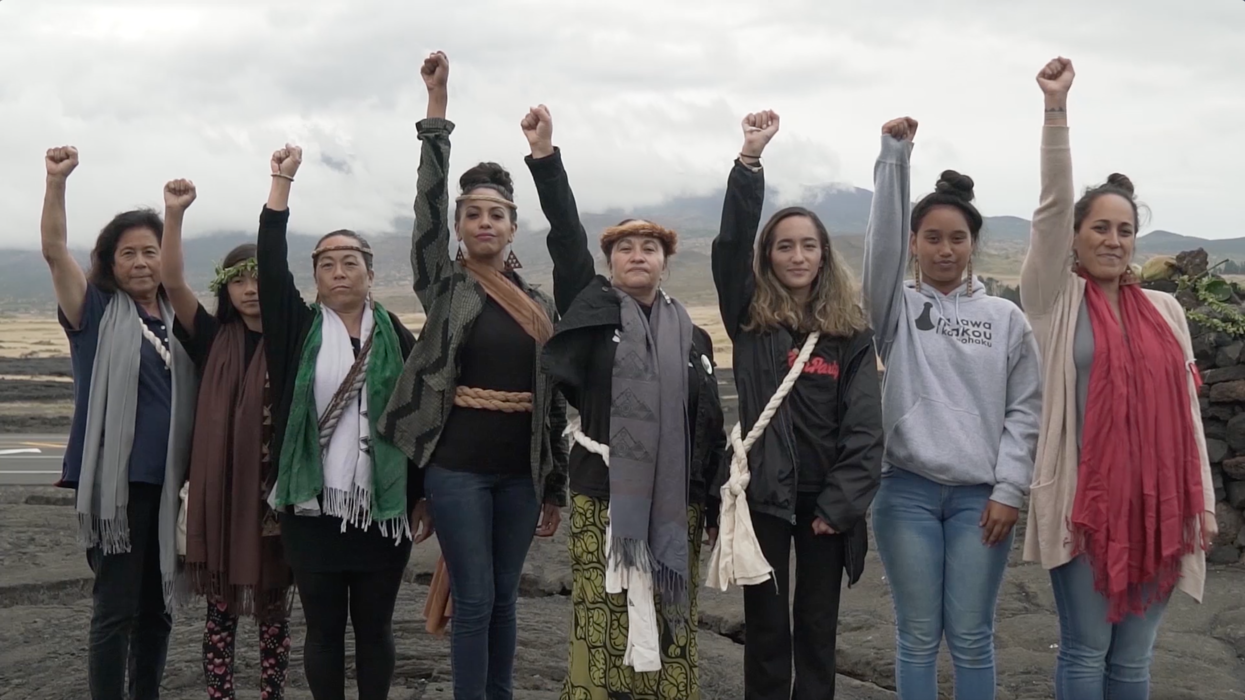Pua Case on Mauna Kea

Presented as part of the Art, Technology, and Culture Colloquium, the History and Theory of New Media Lecture Series, and the Indigenous Technologies Initiative. Co-sponsored by the American Indian Graduate Program, the Arts Research Center, the Department of Ethnic Studies, Media Studies, the Center for Race and Gender, and Native American Studies.
with Pua Case
Kumu Hula, teacher, and aloha ʻāina protector
Moderated by Talia Dixon
Video and Transcript Now Online
Click here to watch the recorded lecture.
Click here to view the transcript.
Pua Case and her family, the Flores-Case ʻOhana are Native Hawaiian activists and caretakers who are an integral part of the Mauna Kea Movement. Through her organization, Mauna Kea Education and Awareness, she and her daughters, Hāwane Rios and Kapulei Flores are committed to ensuring that Mauna Kea is a “presence” on a local and world wide scale and to do their part to protect the mountain from further desecration and destruction. As mother and daughters, they are featured in the short film Standing Above the Clouds, which highlights the intergenerational role of women in the Mauna Kea ʻOhana as they stand together in courage and strength to safeguard the sacred.
About Pua Case
Pua Case was born and raised on the Island of Hawai’i surrounded by the high mountains of Mauna Kea, Mauna Loa, Hualalai and Kohala. She is a Kumu Hula, a teacher of traditional dance and chant, and a teacher of the ways, culture and traditions of the kanaka maoli or native peoples of Hawai’i. Pua and her family are petitioners in the Contested Case hearing filed on behalf of Mauna Kea Mountain. As a representative of the Mauna Kea ‘Ohana, she and her family have traveled throughout the continent, to Europe and various places across the Pacific over the last seven years to network, build relationships and form alliances with organizations, tribes and individuals who are facing similar issues regarding their cultural life ways, traditions and land bases in order to create a platform for protection of sacred places, social justice and positive change.
About Talia Dixon
Talia is a second year graduate student in performance studies at UC Berkeley with interests in Indigenous studies, Native American law, Native California, and Indigenous ecologies. She graduated from the University of Utah in 2021 with an HBFA in modern dance and minor in Native American studies. Talia is Payómkawichum, enrolled in the Pauma Band of Luiseño Indians and her graduate work focuses on the embodied performance of Indigenous knowledge and culture.
Indigenous Technologies
Indigenous Technologies is a program of the Berkeley Center for New Media that engages questions of technology and new media in relation to global structures of indigeneity, settler colonialism and genocide in the 21st century. Our Indigenous Tech events and ongoing conversations with Indigenous scholars and communities aim to critically envision and reimagine what a more just and sustainable technological future can look like. We will highlight Indigenous engagements with robotics, computer science, telecommunications, artificial intelligence, virtual reality, social media, online activism, video games, and more.
Read a full description of the program and find more resources here.
Indigenous Technologies Events
Fall 2022
08/29 | 5:00 — 6:30 PM | Pua Case on Mauna Kea
Pua Case, Kumu Hula, teacher, and aloha ʻāina protector
Online event co-sponsored by The American Indian Graduate Program, the Arts Research Center, The Center for Race and Gender, Media Studies, the Department of Ethnic Studies, and Native American Studies.
Register here.
10/31 | 5:00 — 6:30 PM | Digital Platforms and Ancient African Knowledge Systems: Triumphs and Vulnerabilities
Gloria Emeagwali, Professor of History at Central Connecticut State University
Online event co-sponsored by the American Indian Graduate Program, the Arts Research Center, the Center for Race and Gender, Media Studies, Ethnic Studies, Native American Studies, and the School of Information.
Register here.
Accessiblity
BCNM events are free and open to the public. This event will be held on Zoom in English, in Pacific Standard Time (PST). We provide live-captioning in Zoom and offer a separate Streamtext window for live-captioning with options to customize text size and display. We strive to meet any additional access and accommodation needs. Please contact info.bcnm [at] berkeley.edu with requests or questions.
BCNM is proud to make conversations with leading scholars, artists, and technologists freely available to the public. Please help us continue this tradition by making a tax-deductible donation today. If you are in the position to support the program, we suggest $5 per event, or $100 a year.
